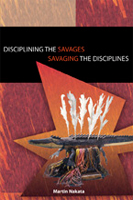Disciplining the Savages: Savaging the disciplines
Summary
Disciplining the savages: Savaging the disciplines provides alternative reading for those struggling with the contradictory and ambiguous intersections of academia and Indigenous experience. In doing so, it moves beyond the usual criticisms of the disciplines which construct the way we have come to know and understand Indigenous peoples.
Nakata, a Torres Strait Islander academic, casts a critical gaze on the research conducted by the Cambridge Expedition in the late 1890s. Meticulously analysing the linguistic, physiological, psychological and anthropological testing conducted, he offers an astute critique of the researchers’ methodologies and interpretations. He uses these insights to reveal the similar workings of recent knowledge production in Torres Strait education.
In systematically deconstructing these knowledges, Nakata draws eloquently on both the Torres Strait Islander struggle and his own personal struggle to break free from imposed definitions, and reminds us that such intellectual journeys are highly personal and political.
Nakata argues for the recognition of the complexity of the space Indigenous people now live in — the cultural interface — and proposes an alternative theoretical standpoint to account for Indigenous experience of this space.
Professor Martin Nakata is the Director of Nura Gili at the University of New South Wales (UNSW). He also holds the title of Chair of Australian Indigenous Education.
Reviews and endorsements
'Martin Nakata's book […] represents the most focussed and sustained Indigenous critique of anthropological knowledge yet published. It is impressive, rigorous, and sometimes poignant: a must-read for anyone concerned with the troubled interplay of Indigenous issues and academic institutions in Australia today.'
— Professor Nicholas Thomas, University of Cambridge
'Nakata here reveals himself as an Indigenous philosopher of the first rank.'
— Associate Professor Regina Ganter, Griffith University
'Nakata’s book is of first importance in the current debate over policies towards indigenous education. It is a product of the cultural interface that Nakata describes and is an important contribution from a scholar and activist who is eminently qualified.'
— Robert Kenny, Australian Humanities Review, Issue 46, 2007
'Disciplining the savages: Savaging the disciplines is a significant book because it examines Torres Strait Islander history, a field of Australian studies which has remained largely unexplored. Further, it examines this history from an Islander's perspective.'
— Shino Konishi, Journal of Australian Studies, June 2008
'Nakata’s wish to contribute to the educational experience of Torres Strait Islanders makes this a highly original book that is sure to become an important resource for Indigenous and non-Indigenous academics wanting to bring Indigenous knowledge, traditions, and systems into teaching and learning contexts.'
— Peta Stephenson, Australian Historical Studies, 39, June 2008
'This work represents a significant shift in Indigenous research, a turnaround that centres the native viewpoint and turns the academic gaze back upon itself. This decolonisation is apparent in the clever title, which effectively changes the status in Indigenous people in research from object to subject. However, the work goes beyond merely buttressing anticolonial positions, proposing a vision of future research and an Indigenous Standpoint theory.'
— Sue McGinty & Tyson Yunkaporta, Journal of the Royal Anthropological Institute, June 2009
'This book represents an important statement of academic achievement by a Torres Strait Islander, one who has navigated through the demands of Western education and notably the first who has achieved a university doctorate. Nakata is thus well placed to critique Western knowledge acquisition and its impacts on ‘Islander’ peoples.'
— Vicki Grieves, Cultural Studies Review, Vol. 15, No. 2, September 2009
Find Disciplining the Savages: Savaging the disciplines on the AIATSIS shop.
You can also buy it from online retailers as an ebook.
